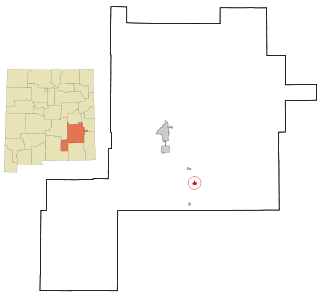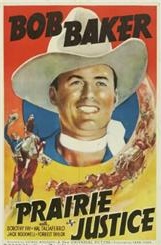This article needs additional citations for verification .(August 2008) (Learn how and when to remove this template message) |
S. Omar Barker (1894–1985), an oft-recited cowboy poet [1] was born in a log cabin in New Mexico where he lived his entire life as a rancher, teacher and writer. He published many books, including Vientos de las Sierras (1924), Buckaroo Ballads (1928) and Rawhide Rhymes: Singing Poems of the Old West (Doubleday, 1968).

A log cabin is a small log house, especially a less finished or architecturally sophisticated structure. Log cabins have an ancient history in Europe, and in America are often associated with first generation home building by settlers.

New Mexico is a state in the Southwestern region of the United States of America; its capital and cultural center is Santa Fe which was founded in 1610 as capital of Nuevo México, while its largest city is Albuquerque with its accompanying metropolitan area. It is one of the Mountain States and shares the Four Corners region with Utah, Colorado, and Arizona; its other neighboring states are Oklahoma to the northeast, Texas to the east-southeast, and the Mexican states of Chihuahua to the south and Sonora to the southwest. With a population around two million, New Mexico is the 36th state by population. With a total area of 121,590 sq mi (314,900 km2), it is the fifth-largest and sixth-least densely populated of the 50 states. Due to their geographic locations, northern and eastern New Mexico exhibit a colder, alpine climate, while western and southern New Mexico exhibit a warmer, arid climate.
Squire Omar Barker, named after his father, was born on a small mountain ranch at Beulah, New Mexico, in 1894, youngest of the eleven children of Squire Leander and Priscilla Jane Barker. He grew up on the family homestead, attended high school and college in Las Vegas, New Mexico, was in his youth a teacher of Spanish, a high school principal, a forest ranger, a sergeant of the 502nd Engineers in France in World War I, a trombone player in Doc Patterson's Cowboy Band, a state legislator and a newspaper correspondent. He began writing and selling stories, articles, and poems as early as 1914 and became a full-time writer at the end of his legislative term in 1925. He married Elsa McCormick of Hagerman, New Mexico, in 1927, and she also became a noted writer of Western stories.

Las Vegas is a city in and the county seat of San Miguel County, New Mexico, United States. Once two separate municipalities, both were named Las Vegas—West Las Vegas and East Las Vegas —are separated by the Gallinas River and retain distinct characters and separate, rival school districts.

World War I, also known as the First World War or the Great War, was a global war originating in Europe that lasted from 28 July 1914 to 11 November 1918. Contemporaneously described as "the war to end all wars", it led to the mobilisation of more than 70 million military personnel, including 60 million Europeans, making it one of the largest wars in history. It is also one of the deadliest conflicts in history, with an estimated nine million combatants and seven million civilian deaths as a direct result of the war, while resulting genocides and the 1918 influenza pandemic caused another 50 to 100 million deaths worldwide.

Hagerman is a town in Chaves County, New Mexico, United States. The population was 1,251 at the 2010 census.
He once estimated his career output at about 1,500 short stories and novelettes, about 1,200 factual articles, about 2,000 poems. They appeared in a broad range of publications from pulp magazines to such prestigious slicks as Saturday Evening Post and a varied array of general newspapers and magazines. He produced five volumes of poetry, one book of short stories and one novel, Little World Apart, as well as one western cookbook with Carol Truax. He was even a co-writer for one episode of the TV western "Sugarfoot" in 1957. [2]
The work probably best known to the general public was his poem, "A Cowboy's Christmas Prayer," which has been printed more than one hundred times, recorded by Tennessee Ernie Ford and Jimmy Dean, and plagiarized more than once. He won the Western Writers of America Spur Award twice and was the 1967 recipient of the Levi Strauss Saddleman Award for bringing honor and dignity to the Western legend. In 1975 he was named an honorary president of WWA, of which he was one of the founding fathers and an early president. Elsa also served a term as president. In 1978 he was the first living author to be inducted into the Hall of Fame of Great Westerners in the National Cowboy Hall of Fame, Oklahoma City.

Ernest Jennings Ford, known professionally as Tennessee Ernie Ford, was an American recording artist and television host who enjoyed success in the country and Western, pop, and gospel musical genres. Noted for his rich bass-baritone voice and down-home humor, he is remembered for his hit recordings of "The Shotgun Boogie" and "Sixteen Tons".

Jimmy Ray Dean was an American country music singer, television host, actor, and businessman. He was the creator of the Jimmy Dean sausage brand as well as the spokesman for its TV commercials.

Western Writers of America, founded 1953, promotes literature, both fictional and non-fictional, pertaining to the American West. Although its founders wrote traditional western fiction, the more than six hundred current members also include historians and other non-fiction writers as well as authors from other genres.
He was well known as the Sage of Sapello and the Poet Lariat of New Mexico.
Barker used to submit stories and poems to a bi-weekly Western pulp magazine called Ranch Romances. Sometime in the 1930s, he was asked by the editor to rewrite a story submitted by an old Texas cowhand about his life of driving cattle. This cowhand's name was Jack Potter. This started a collaboration between the two that lasted for years. Potter had two books of his published, including "Lead Steer and Other Tales" (1939). It that book he wrote how he met and courted his wife, Cordie, and how he proposed. With Jack's permission, Barker turned that narrative into a poem entitled "Jack Potter's Courtin'" That poem was published in Ranch Romances in September,1941. It has become one of S. Omar Barker's most recited poems.
Prior to publication, however, Potter sent out a copy of "Jack Potter's Courtin'" as a Christmas greeting in 1940. It was professionally printed on the letterhead of the Trail Drivers and Pioneers Association of New Mexico. The stationery also lists officers of the organization, including Jack M. Potter, President, and S. Omar Barker, Historian and Poet. So it seems their trails crossed in connection with involvements other than writing.
Jack and Cordie had a long life together. By the time she died they had been married for over 63 years. Following her death in 1948 Barker sent a letter of condolence to Potter, who responded, "It was awful nice in you writing that nice letter paying tribute to my dear wife. She though a lot of You and Mrs. B, She was always hearing something nice from you."
He often signed his books with his initials and trademark brand, "Lazy SOB." [3]









